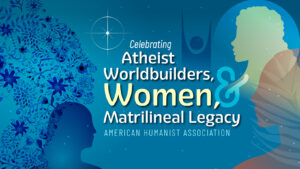Atheist World Builders, Women, and Matrilineal Legacy

This month the American Humanist Association (AHA) is focusing on a theme of “Atheist World Builders, Women, and Matrilineal Legacy,” situated inside of Women’s History Month. Social and religious movements across sectors have come face to face with the contradiction that, while the men of the movement were at the podium and in the pictures, the women and femme folks were doing massive amounts of unseen labor.
I think about the Black women freethinkers whose stories of nonbelief have been obscured in many of our histories: Audley Moore, Grace P. Campbell, and Elizabeth Hendrickson. I also think of how the role of women in the Enlightenment is still debated: Catharine Macaulay, Olympe de Gouges, and Moll King’s coffeehouse.
Had my generation been taught about the ideas, practices, and principles within these matrilineal legacies more broadly, what could our society look like today? What I most hope for during this month is that we do not apply the standards of today to our foremothers. In her 2009 Ted Talk, novelist Chimamanda Adichie offers a wise warning regarding the dangers of a single story. Embracing a single story on an individual or collective level risks grave misunderstanding and, I contend, limits our ability to connect to humanity. Painting others as problematic has become a normative practice that shuts down critical thinking, nuance, and the ability to contextualize the complexity of our individual and collective lives. Margaret Sanger is an example of how you can, all at the same time, help to advance society toward humanistic ends while also engaging in strategies and tactics that, upon contemporary reflection, can be characterized as problematic and even harmful.
These historical realities are non-unique and persist today. Undoubtedly, particular to the United States context, the myth of the father-led “nuclear family” is strong and well financed. From culture, commercial industries, to non-governmental organizations, many movements have attempted to reckon with the power of the Patriarchy. The American Dad trope in media as well as government-informed disinformation regarding the American family have enforced flattened stories about caretaking binaries. These “model families” across American history have contributed to diminishing community and kinship ties and codified state-sanctioned and provide familial structures.
The United States is the only industrialized nation with 0% federally-mandated, paid maternity leave. According to The Chamber of Mothers, “The physical and mental health of U.S. mothers—so vulnerable to systemic failures and bias—is in crisis, with 93% of moms reporting burnout, 72% of women with moderate to high anxiety levels (compared to 29% pre-pandemic), and a maternal mortality rate that is one of the worst in the world, especially for women of color.”
To ensure the future of our movements, we must reckon with the difficult truth that many non-theists within our histories and today utilize the same weapons used by authoritarian religious movements to suppress women and obfuscate the role of women in society.
Who are the humanist and atheist world-building women and femmes who we have yet to see? How can we critique and learn from them? What are their stories and how can we invite individual and collective celebration of them? How can we embrace the fullness of our histories, across difference, without judgment or shame? If we will tell complex stories of our foremothers, I believe this to be true: Humanist and atheist women are worldbuilders and their ancestral knowledge can ensure humanism survives the end of the 21st century and thrives beyond it.
